Entrepreneurship Report: Business Types, Impact, Skills, and Traits
VerifiedAdded on 2020/06/04
|14
|3986
|101
Report
AI Summary
This report delves into the multifaceted world of entrepreneurship, examining various business types, including small-scale, scalable, large businesses, and social entrepreneurship, and their distinct characteristics. It highlights the similarities and differences among these ventures, emphasizing the role of business owners and entrepreneurs, and the importance of social business models. The report further investigates the significant impact of small businesses on the economy, particularly in the UK, discussing their contributions to job creation and economic growth. It explores how small businesses and startups foster the development of the social economy, adapting to fluctuating climates and driving future growth. Finally, the report identifies the crucial skills, traits, and characteristics of successful entrepreneurs, such as motivation, risk-taking, hard work, adaptability, money management, and planning. This report offers valuable insights into the entrepreneurial landscape, providing a comprehensive overview of key concepts, challenges, and success factors in the realm of business and innovation.

ENTREPRENEURSHIP
Paraphrase This Document
Need a fresh take? Get an instant paraphrase of this document with our AI Paraphraser
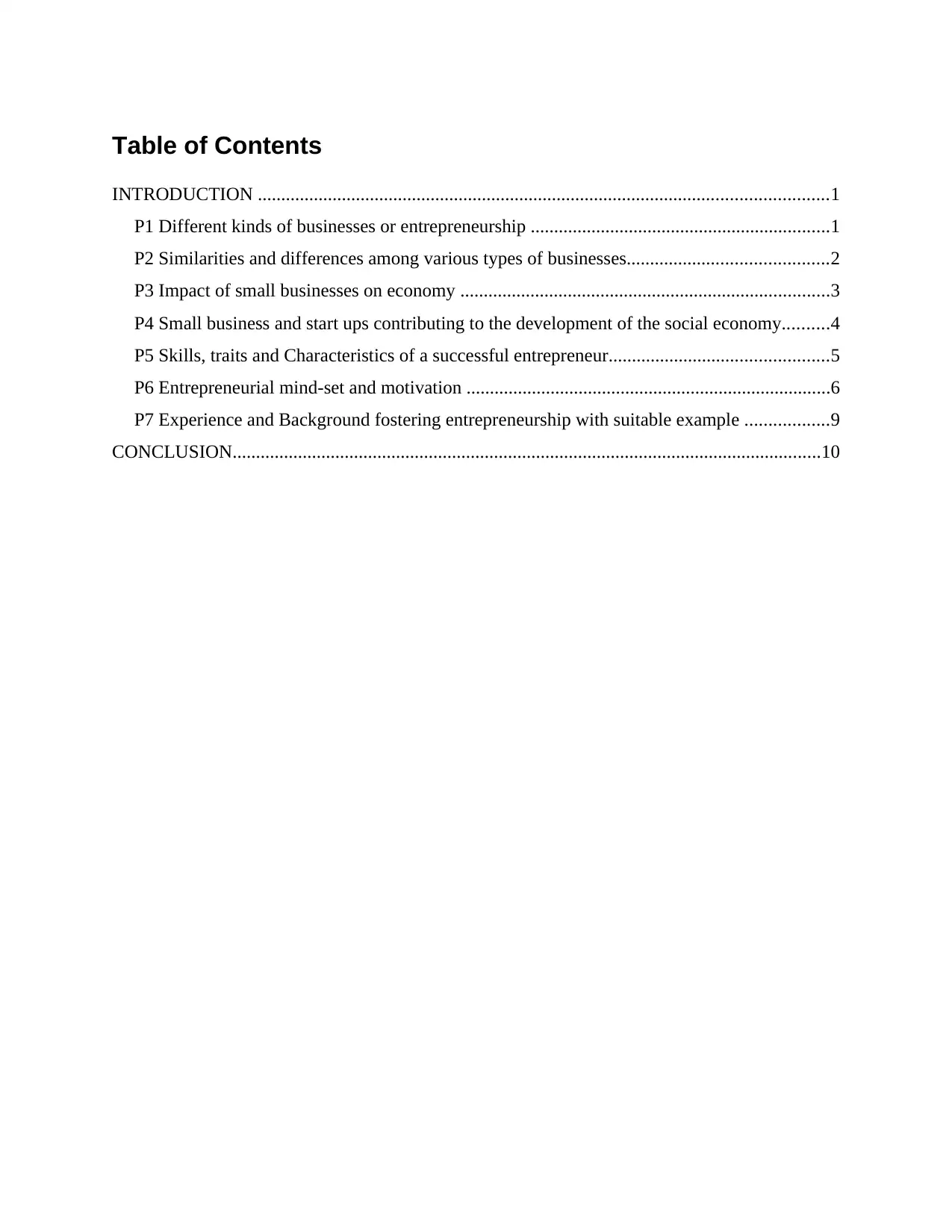
Table of Contents
INTRODUCTION ..........................................................................................................................1
P1 Different kinds of businesses or entrepreneurship ................................................................1
P2 Similarities and differences among various types of businesses...........................................2
P3 Impact of small businesses on economy ...............................................................................3
P4 Small business and start ups contributing to the development of the social economy..........4
P5 Skills, traits and Characteristics of a successful entrepreneur...............................................5
P6 Entrepreneurial mind-set and motivation ..............................................................................6
P7 Experience and Background fostering entrepreneurship with suitable example ..................9
CONCLUSION..............................................................................................................................10
INTRODUCTION ..........................................................................................................................1
P1 Different kinds of businesses or entrepreneurship ................................................................1
P2 Similarities and differences among various types of businesses...........................................2
P3 Impact of small businesses on economy ...............................................................................3
P4 Small business and start ups contributing to the development of the social economy..........4
P5 Skills, traits and Characteristics of a successful entrepreneur...............................................5
P6 Entrepreneurial mind-set and motivation ..............................................................................6
P7 Experience and Background fostering entrepreneurship with suitable example ..................9
CONCLUSION..............................................................................................................................10
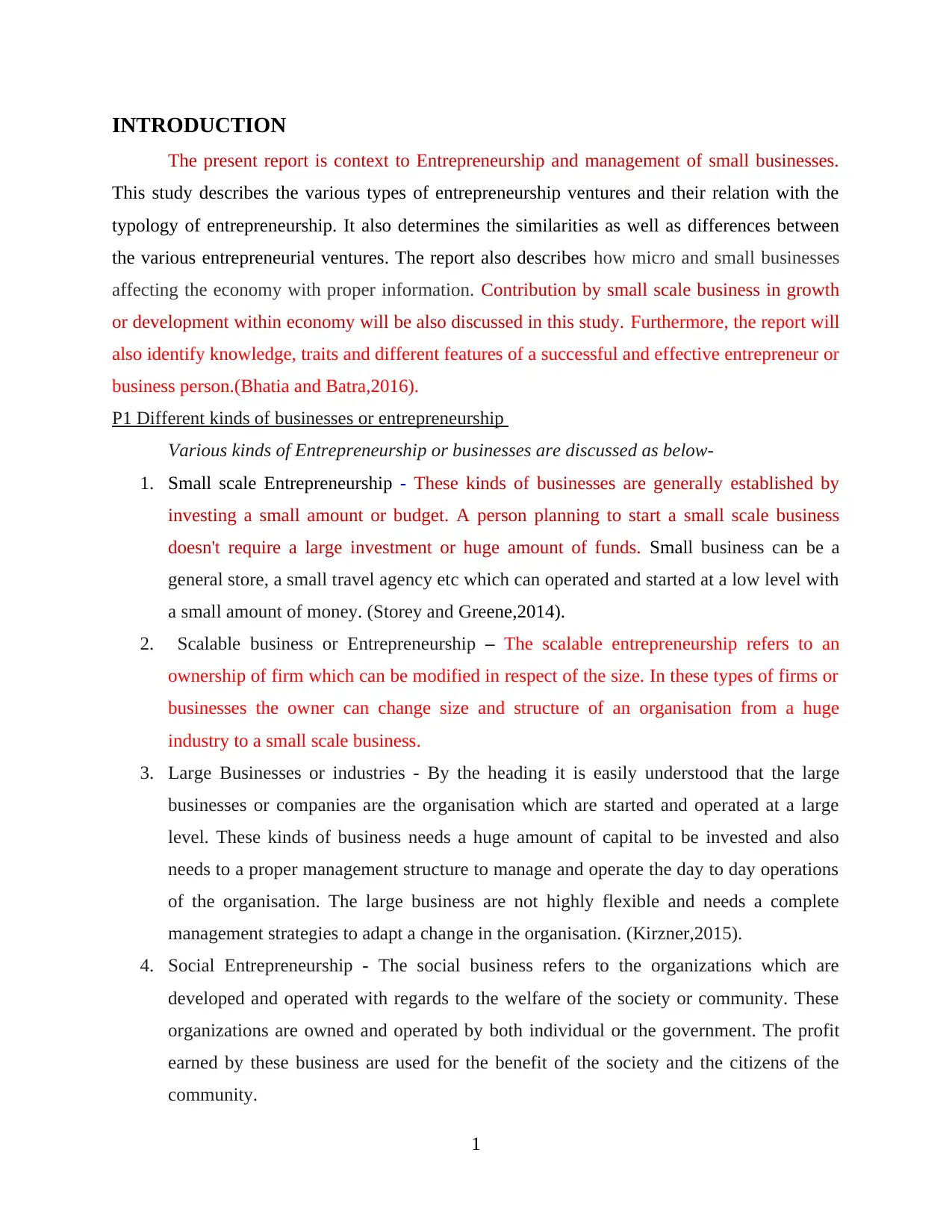
INTRODUCTION
The present report is context to Entrepreneurship and management of small businesses.
This study describes the various types of entrepreneurship ventures and their relation with the
typology of entrepreneurship. It also determines the similarities as well as differences between
the various entrepreneurial ventures. The report also describes how micro and small businesses
affecting the economy with proper information. Contribution by small scale business in growth
or development within economy will be also discussed in this study. Furthermore, the report will
also identify knowledge, traits and different features of a successful and effective entrepreneur or
business person.(Bhatia and Batra,2016).
P1 Different kinds of businesses or entrepreneurship
Various kinds of Entrepreneurship or businesses are discussed as below-
1. Small scale Entrepreneurship - These kinds of businesses are generally established by
investing a small amount or budget. A person planning to start a small scale business
doesn't require a large investment or huge amount of funds. Small business can be a
general store, a small travel agency etc which can operated and started at a low level with
a small amount of money. (Storey and Greene,2014).
2. Scalable business or Entrepreneurship – The scalable entrepreneurship refers to an
ownership of firm which can be modified in respect of the size. In these types of firms or
businesses the owner can change size and structure of an organisation from a huge
industry to a small scale business.
3. Large Businesses or industries - By the heading it is easily understood that the large
businesses or companies are the organisation which are started and operated at a large
level. These kinds of business needs a huge amount of capital to be invested and also
needs to a proper management structure to manage and operate the day to day operations
of the organisation. The large business are not highly flexible and needs a complete
management strategies to adapt a change in the organisation. (Kirzner,2015).
4. Social Entrepreneurship - The social business refers to the organizations which are
developed and operated with regards to the welfare of the society or community. These
organizations are owned and operated by both individual or the government. The profit
earned by these business are used for the benefit of the society and the citizens of the
community.
1
The present report is context to Entrepreneurship and management of small businesses.
This study describes the various types of entrepreneurship ventures and their relation with the
typology of entrepreneurship. It also determines the similarities as well as differences between
the various entrepreneurial ventures. The report also describes how micro and small businesses
affecting the economy with proper information. Contribution by small scale business in growth
or development within economy will be also discussed in this study. Furthermore, the report will
also identify knowledge, traits and different features of a successful and effective entrepreneur or
business person.(Bhatia and Batra,2016).
P1 Different kinds of businesses or entrepreneurship
Various kinds of Entrepreneurship or businesses are discussed as below-
1. Small scale Entrepreneurship - These kinds of businesses are generally established by
investing a small amount or budget. A person planning to start a small scale business
doesn't require a large investment or huge amount of funds. Small business can be a
general store, a small travel agency etc which can operated and started at a low level with
a small amount of money. (Storey and Greene,2014).
2. Scalable business or Entrepreneurship – The scalable entrepreneurship refers to an
ownership of firm which can be modified in respect of the size. In these types of firms or
businesses the owner can change size and structure of an organisation from a huge
industry to a small scale business.
3. Large Businesses or industries - By the heading it is easily understood that the large
businesses or companies are the organisation which are started and operated at a large
level. These kinds of business needs a huge amount of capital to be invested and also
needs to a proper management structure to manage and operate the day to day operations
of the organisation. The large business are not highly flexible and needs a complete
management strategies to adapt a change in the organisation. (Kirzner,2015).
4. Social Entrepreneurship - The social business refers to the organizations which are
developed and operated with regards to the welfare of the society or community. These
organizations are owned and operated by both individual or the government. The profit
earned by these business are used for the benefit of the society and the citizens of the
community.
1
⊘ This is a preview!⊘
Do you want full access?
Subscribe today to unlock all pages.

Trusted by 1+ million students worldwide
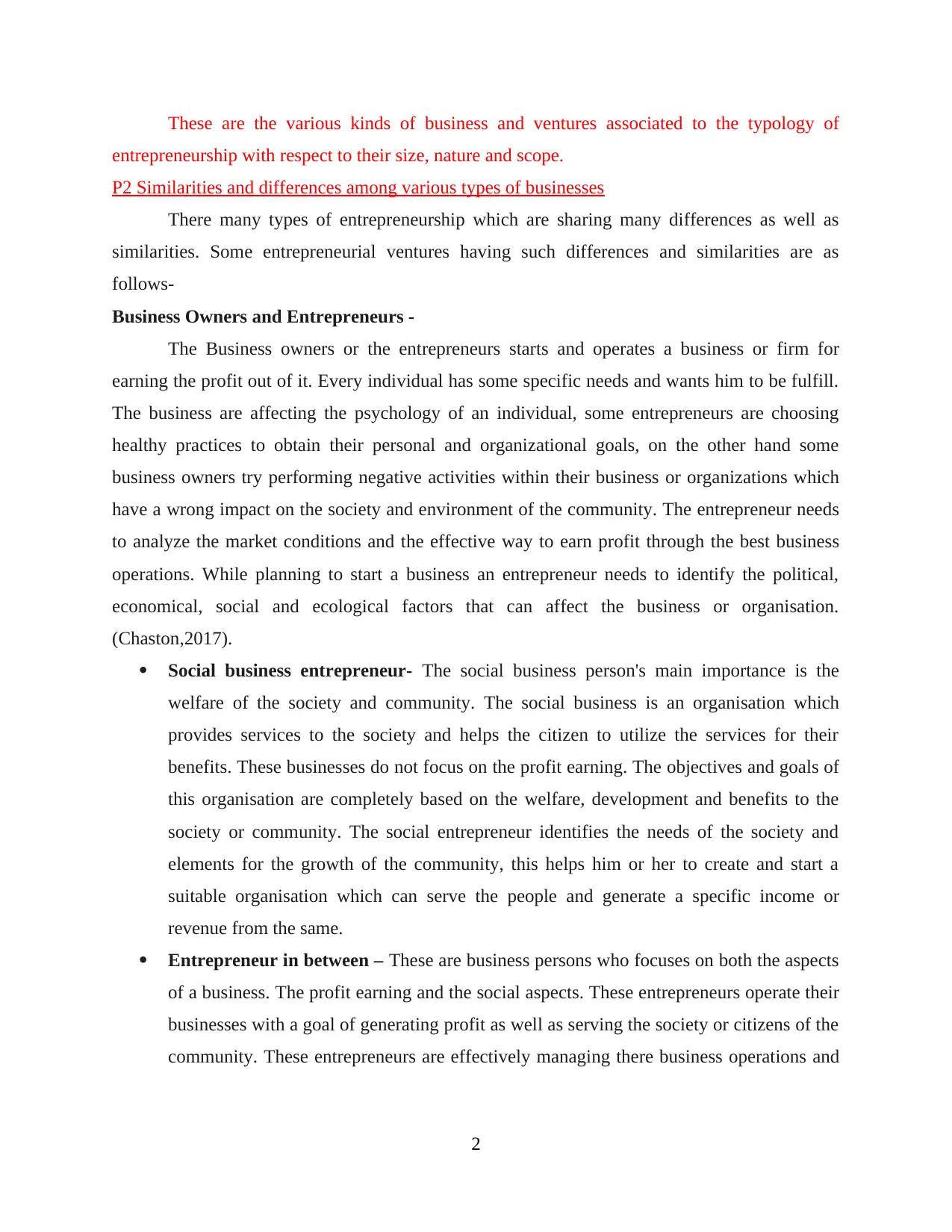
These are the various kinds of business and ventures associated to the typology of
entrepreneurship with respect to their size, nature and scope.
P2 Similarities and differences among various types of businesses
There many types of entrepreneurship which are sharing many differences as well as
similarities. Some entrepreneurial ventures having such differences and similarities are as
follows-
Business Owners and Entrepreneurs -
The Business owners or the entrepreneurs starts and operates a business or firm for
earning the profit out of it. Every individual has some specific needs and wants him to be fulfill.
The business are affecting the psychology of an individual, some entrepreneurs are choosing
healthy practices to obtain their personal and organizational goals, on the other hand some
business owners try performing negative activities within their business or organizations which
have a wrong impact on the society and environment of the community. The entrepreneur needs
to analyze the market conditions and the effective way to earn profit through the best business
operations. While planning to start a business an entrepreneur needs to identify the political,
economical, social and ecological factors that can affect the business or organisation.
(Chaston,2017).
Social business entrepreneur- The social business person's main importance is the
welfare of the society and community. The social business is an organisation which
provides services to the society and helps the citizen to utilize the services for their
benefits. These businesses do not focus on the profit earning. The objectives and goals of
this organisation are completely based on the welfare, development and benefits to the
society or community. The social entrepreneur identifies the needs of the society and
elements for the growth of the community, this helps him or her to create and start a
suitable organisation which can serve the people and generate a specific income or
revenue from the same.
Entrepreneur in between – These are business persons who focuses on both the aspects
of a business. The profit earning and the social aspects. These entrepreneurs operate their
businesses with a goal of generating profit as well as serving the society or citizens of the
community. These entrepreneurs are effectively managing there business operations and
2
entrepreneurship with respect to their size, nature and scope.
P2 Similarities and differences among various types of businesses
There many types of entrepreneurship which are sharing many differences as well as
similarities. Some entrepreneurial ventures having such differences and similarities are as
follows-
Business Owners and Entrepreneurs -
The Business owners or the entrepreneurs starts and operates a business or firm for
earning the profit out of it. Every individual has some specific needs and wants him to be fulfill.
The business are affecting the psychology of an individual, some entrepreneurs are choosing
healthy practices to obtain their personal and organizational goals, on the other hand some
business owners try performing negative activities within their business or organizations which
have a wrong impact on the society and environment of the community. The entrepreneur needs
to analyze the market conditions and the effective way to earn profit through the best business
operations. While planning to start a business an entrepreneur needs to identify the political,
economical, social and ecological factors that can affect the business or organisation.
(Chaston,2017).
Social business entrepreneur- The social business person's main importance is the
welfare of the society and community. The social business is an organisation which
provides services to the society and helps the citizen to utilize the services for their
benefits. These businesses do not focus on the profit earning. The objectives and goals of
this organisation are completely based on the welfare, development and benefits to the
society or community. The social entrepreneur identifies the needs of the society and
elements for the growth of the community, this helps him or her to create and start a
suitable organisation which can serve the people and generate a specific income or
revenue from the same.
Entrepreneur in between – These are business persons who focuses on both the aspects
of a business. The profit earning and the social aspects. These entrepreneurs operate their
businesses with a goal of generating profit as well as serving the society or citizens of the
community. These entrepreneurs are effectively managing there business operations and
2
Paraphrase This Document
Need a fresh take? Get an instant paraphrase of this document with our AI Paraphraser
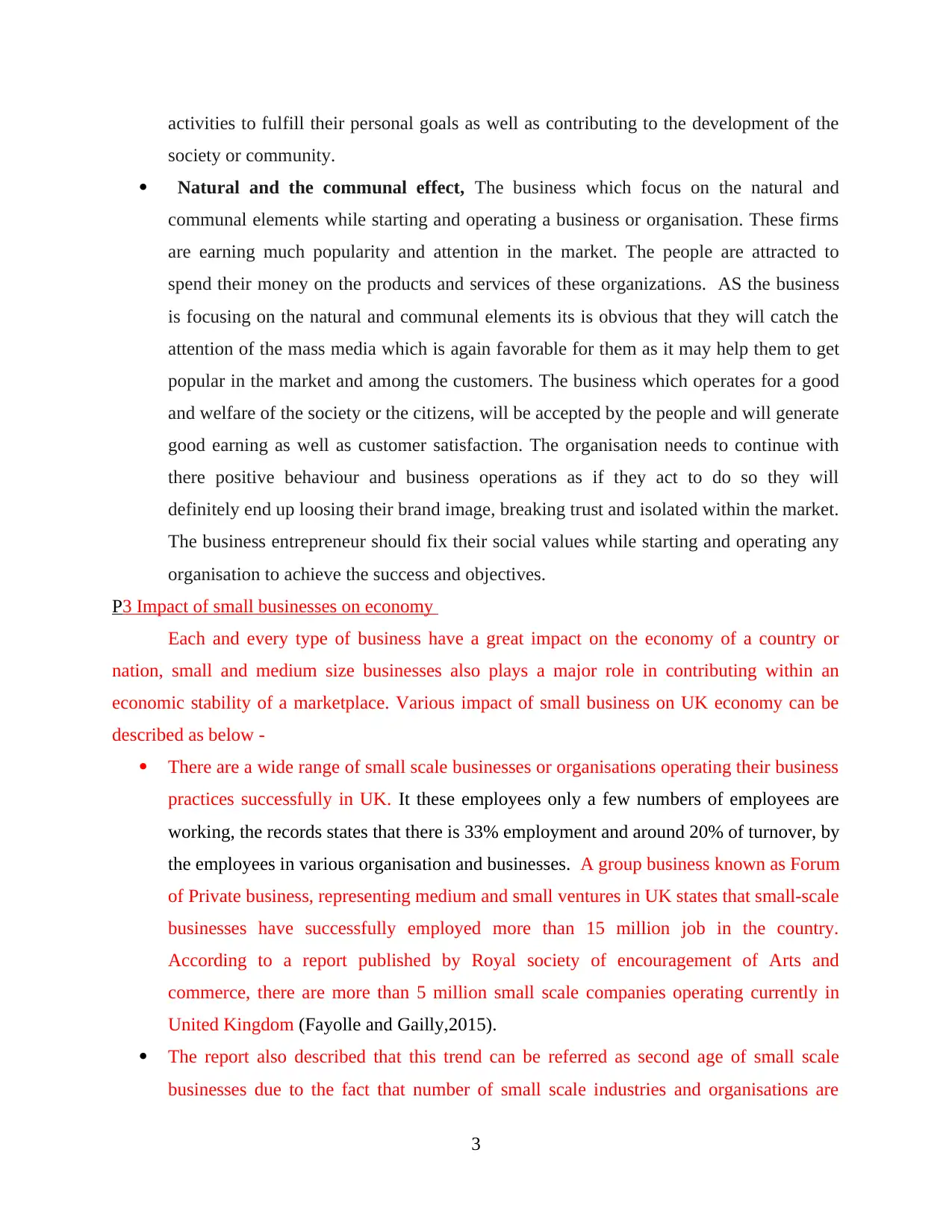
activities to fulfill their personal goals as well as contributing to the development of the
society or community.
Natural and the communal effect, The business which focus on the natural and
communal elements while starting and operating a business or organisation. These firms
are earning much popularity and attention in the market. The people are attracted to
spend their money on the products and services of these organizations. AS the business
is focusing on the natural and communal elements its is obvious that they will catch the
attention of the mass media which is again favorable for them as it may help them to get
popular in the market and among the customers. The business which operates for a good
and welfare of the society or the citizens, will be accepted by the people and will generate
good earning as well as customer satisfaction. The organisation needs to continue with
there positive behaviour and business operations as if they act to do so they will
definitely end up loosing their brand image, breaking trust and isolated within the market.
The business entrepreneur should fix their social values while starting and operating any
organisation to achieve the success and objectives.
P3 Impact of small businesses on economy
Each and every type of business have a great impact on the economy of a country or
nation, small and medium size businesses also plays a major role in contributing within an
economic stability of a marketplace. Various impact of small business on UK economy can be
described as below -
There are a wide range of small scale businesses or organisations operating their business
practices successfully in UK. It these employees only a few numbers of employees are
working, the records states that there is 33% employment and around 20% of turnover, by
the employees in various organisation and businesses. A group business known as Forum
of Private business, representing medium and small ventures in UK states that small-scale
businesses have successfully employed more than 15 million job in the country.
According to a report published by Royal society of encouragement of Arts and
commerce, there are more than 5 million small scale companies operating currently in
United Kingdom (Fayolle and Gailly,2015).
The report also described that this trend can be referred as second age of small scale
businesses due to the fact that number of small scale industries and organisations are
3
society or community.
Natural and the communal effect, The business which focus on the natural and
communal elements while starting and operating a business or organisation. These firms
are earning much popularity and attention in the market. The people are attracted to
spend their money on the products and services of these organizations. AS the business
is focusing on the natural and communal elements its is obvious that they will catch the
attention of the mass media which is again favorable for them as it may help them to get
popular in the market and among the customers. The business which operates for a good
and welfare of the society or the citizens, will be accepted by the people and will generate
good earning as well as customer satisfaction. The organisation needs to continue with
there positive behaviour and business operations as if they act to do so they will
definitely end up loosing their brand image, breaking trust and isolated within the market.
The business entrepreneur should fix their social values while starting and operating any
organisation to achieve the success and objectives.
P3 Impact of small businesses on economy
Each and every type of business have a great impact on the economy of a country or
nation, small and medium size businesses also plays a major role in contributing within an
economic stability of a marketplace. Various impact of small business on UK economy can be
described as below -
There are a wide range of small scale businesses or organisations operating their business
practices successfully in UK. It these employees only a few numbers of employees are
working, the records states that there is 33% employment and around 20% of turnover, by
the employees in various organisation and businesses. A group business known as Forum
of Private business, representing medium and small ventures in UK states that small-scale
businesses have successfully employed more than 15 million job in the country.
According to a report published by Royal society of encouragement of Arts and
commerce, there are more than 5 million small scale companies operating currently in
United Kingdom (Fayolle and Gailly,2015).
The report also described that this trend can be referred as second age of small scale
businesses due to the fact that number of small scale industries and organisations are
3
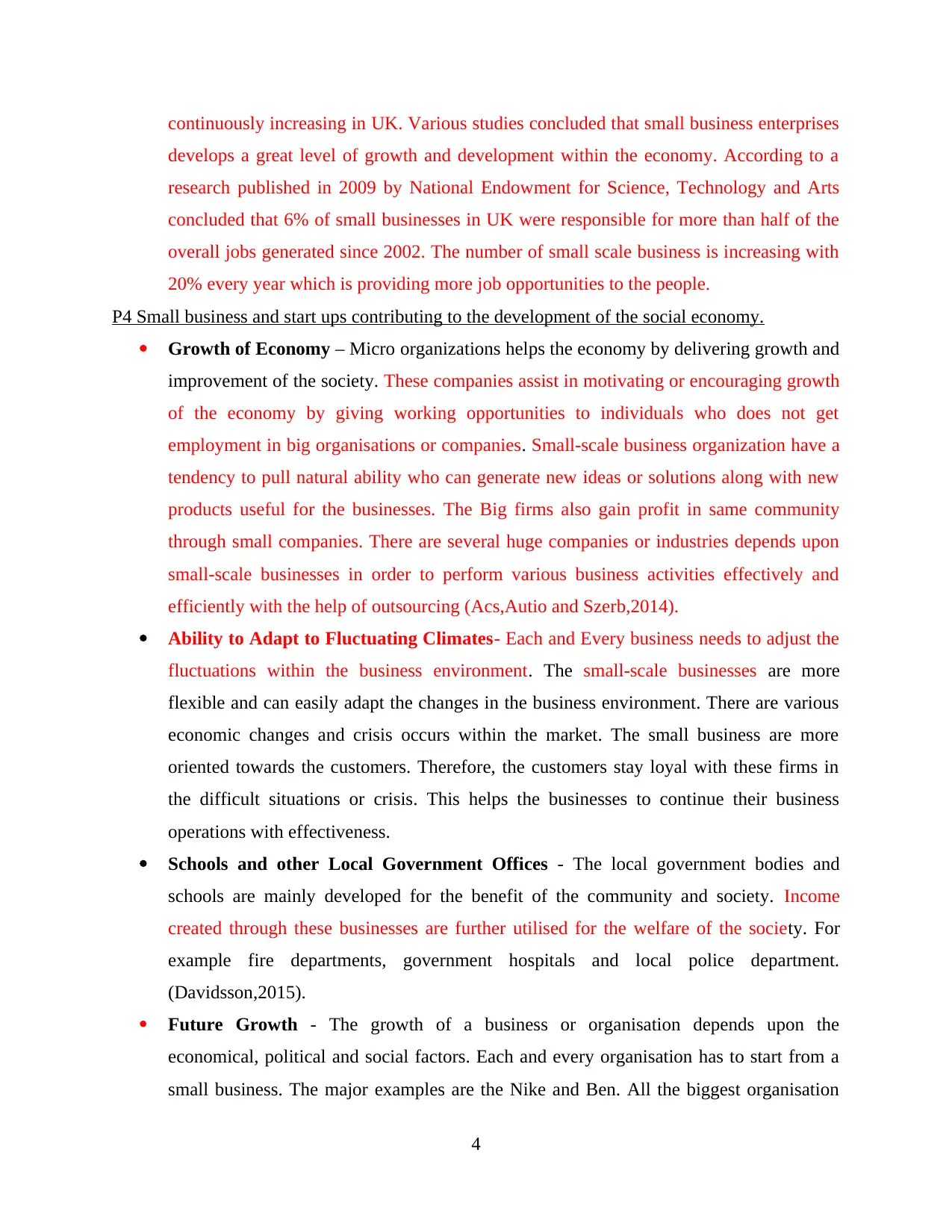
continuously increasing in UK. Various studies concluded that small business enterprises
develops a great level of growth and development within the economy. According to a
research published in 2009 by National Endowment for Science, Technology and Arts
concluded that 6% of small businesses in UK were responsible for more than half of the
overall jobs generated since 2002. The number of small scale business is increasing with
20% every year which is providing more job opportunities to the people.
P4 Small business and start ups contributing to the development of the social economy.
Growth of Economy – Micro organizations helps the economy by delivering growth and
improvement of the society. These companies assist in motivating or encouraging growth
of the economy by giving working opportunities to individuals who does not get
employment in big organisations or companies. Small-scale business organization have a
tendency to pull natural ability who can generate new ideas or solutions along with new
products useful for the businesses. The Big firms also gain profit in same community
through small companies. There are several huge companies or industries depends upon
small-scale businesses in order to perform various business activities effectively and
efficiently with the help of outsourcing (Acs,Autio and Szerb,2014).
Ability to Adapt to Fluctuating Climates- Each and Every business needs to adjust the
fluctuations within the business environment. The small-scale businesses are more
flexible and can easily adapt the changes in the business environment. There are various
economic changes and crisis occurs within the market. The small business are more
oriented towards the customers. Therefore, the customers stay loyal with these firms in
the difficult situations or crisis. This helps the businesses to continue their business
operations with effectiveness.
Schools and other Local Government Offices - The local government bodies and
schools are mainly developed for the benefit of the community and society. Income
created through these businesses are further utilised for the welfare of the society. For
example fire departments, government hospitals and local police department.
(Davidsson,2015).
Future Growth - The growth of a business or organisation depends upon the
economical, political and social factors. Each and every organisation has to start from a
small business. The major examples are the Nike and Ben. All the biggest organisation
4
develops a great level of growth and development within the economy. According to a
research published in 2009 by National Endowment for Science, Technology and Arts
concluded that 6% of small businesses in UK were responsible for more than half of the
overall jobs generated since 2002. The number of small scale business is increasing with
20% every year which is providing more job opportunities to the people.
P4 Small business and start ups contributing to the development of the social economy.
Growth of Economy – Micro organizations helps the economy by delivering growth and
improvement of the society. These companies assist in motivating or encouraging growth
of the economy by giving working opportunities to individuals who does not get
employment in big organisations or companies. Small-scale business organization have a
tendency to pull natural ability who can generate new ideas or solutions along with new
products useful for the businesses. The Big firms also gain profit in same community
through small companies. There are several huge companies or industries depends upon
small-scale businesses in order to perform various business activities effectively and
efficiently with the help of outsourcing (Acs,Autio and Szerb,2014).
Ability to Adapt to Fluctuating Climates- Each and Every business needs to adjust the
fluctuations within the business environment. The small-scale businesses are more
flexible and can easily adapt the changes in the business environment. There are various
economic changes and crisis occurs within the market. The small business are more
oriented towards the customers. Therefore, the customers stay loyal with these firms in
the difficult situations or crisis. This helps the businesses to continue their business
operations with effectiveness.
Schools and other Local Government Offices - The local government bodies and
schools are mainly developed for the benefit of the community and society. Income
created through these businesses are further utilised for the welfare of the society. For
example fire departments, government hospitals and local police department.
(Davidsson,2015).
Future Growth - The growth of a business or organisation depends upon the
economical, political and social factors. Each and every organisation has to start from a
small business. The major examples are the Nike and Ben. All the biggest organisation
4
⊘ This is a preview!⊘
Do you want full access?
Subscribe today to unlock all pages.

Trusted by 1+ million students worldwide
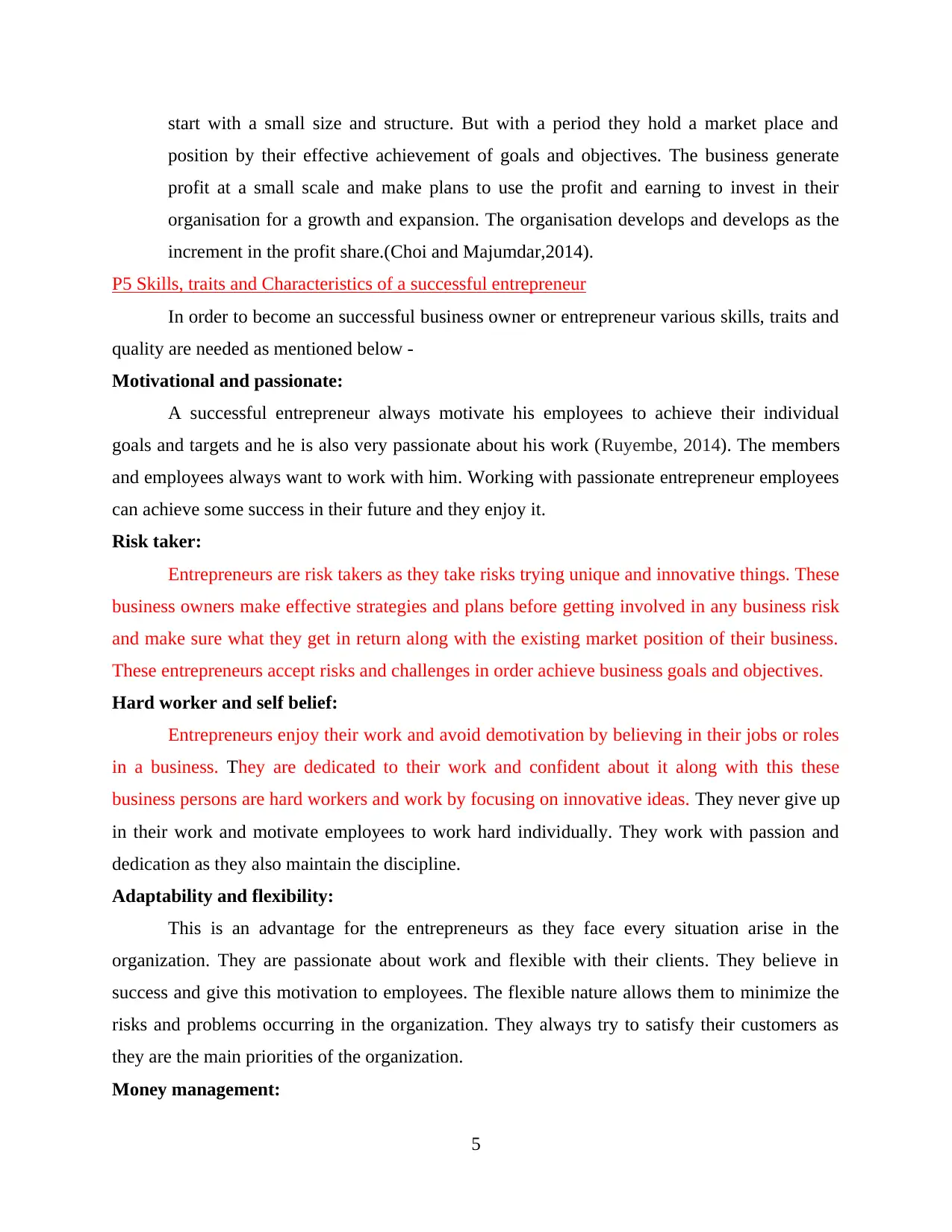
start with a small size and structure. But with a period they hold a market place and
position by their effective achievement of goals and objectives. The business generate
profit at a small scale and make plans to use the profit and earning to invest in their
organisation for a growth and expansion. The organisation develops and develops as the
increment in the profit share.(Choi and Majumdar,2014).
P5 Skills, traits and Characteristics of a successful entrepreneur
In order to become an successful business owner or entrepreneur various skills, traits and
quality are needed as mentioned below -
Motivational and passionate:
A successful entrepreneur always motivate his employees to achieve their individual
goals and targets and he is also very passionate about his work (Ruyembe, 2014). The members
and employees always want to work with him. Working with passionate entrepreneur employees
can achieve some success in their future and they enjoy it.
Risk taker:
Entrepreneurs are risk takers as they take risks trying unique and innovative things. These
business owners make effective strategies and plans before getting involved in any business risk
and make sure what they get in return along with the existing market position of their business.
These entrepreneurs accept risks and challenges in order achieve business goals and objectives.
Hard worker and self belief:
Entrepreneurs enjoy their work and avoid demotivation by believing in their jobs or roles
in a business. They are dedicated to their work and confident about it along with this these
business persons are hard workers and work by focusing on innovative ideas. They never give up
in their work and motivate employees to work hard individually. They work with passion and
dedication as they also maintain the discipline.
Adaptability and flexibility:
This is an advantage for the entrepreneurs as they face every situation arise in the
organization. They are passionate about work and flexible with their clients. They believe in
success and give this motivation to employees. The flexible nature allows them to minimize the
risks and problems occurring in the organization. They always try to satisfy their customers as
they are the main priorities of the organization.
Money management:
5
position by their effective achievement of goals and objectives. The business generate
profit at a small scale and make plans to use the profit and earning to invest in their
organisation for a growth and expansion. The organisation develops and develops as the
increment in the profit share.(Choi and Majumdar,2014).
P5 Skills, traits and Characteristics of a successful entrepreneur
In order to become an successful business owner or entrepreneur various skills, traits and
quality are needed as mentioned below -
Motivational and passionate:
A successful entrepreneur always motivate his employees to achieve their individual
goals and targets and he is also very passionate about his work (Ruyembe, 2014). The members
and employees always want to work with him. Working with passionate entrepreneur employees
can achieve some success in their future and they enjoy it.
Risk taker:
Entrepreneurs are risk takers as they take risks trying unique and innovative things. These
business owners make effective strategies and plans before getting involved in any business risk
and make sure what they get in return along with the existing market position of their business.
These entrepreneurs accept risks and challenges in order achieve business goals and objectives.
Hard worker and self belief:
Entrepreneurs enjoy their work and avoid demotivation by believing in their jobs or roles
in a business. They are dedicated to their work and confident about it along with this these
business persons are hard workers and work by focusing on innovative ideas. They never give up
in their work and motivate employees to work hard individually. They work with passion and
dedication as they also maintain the discipline.
Adaptability and flexibility:
This is an advantage for the entrepreneurs as they face every situation arise in the
organization. They are passionate about work and flexible with their clients. They believe in
success and give this motivation to employees. The flexible nature allows them to minimize the
risks and problems occurring in the organization. They always try to satisfy their customers as
they are the main priorities of the organization.
Money management:
5
Paraphrase This Document
Need a fresh take? Get an instant paraphrase of this document with our AI Paraphraser
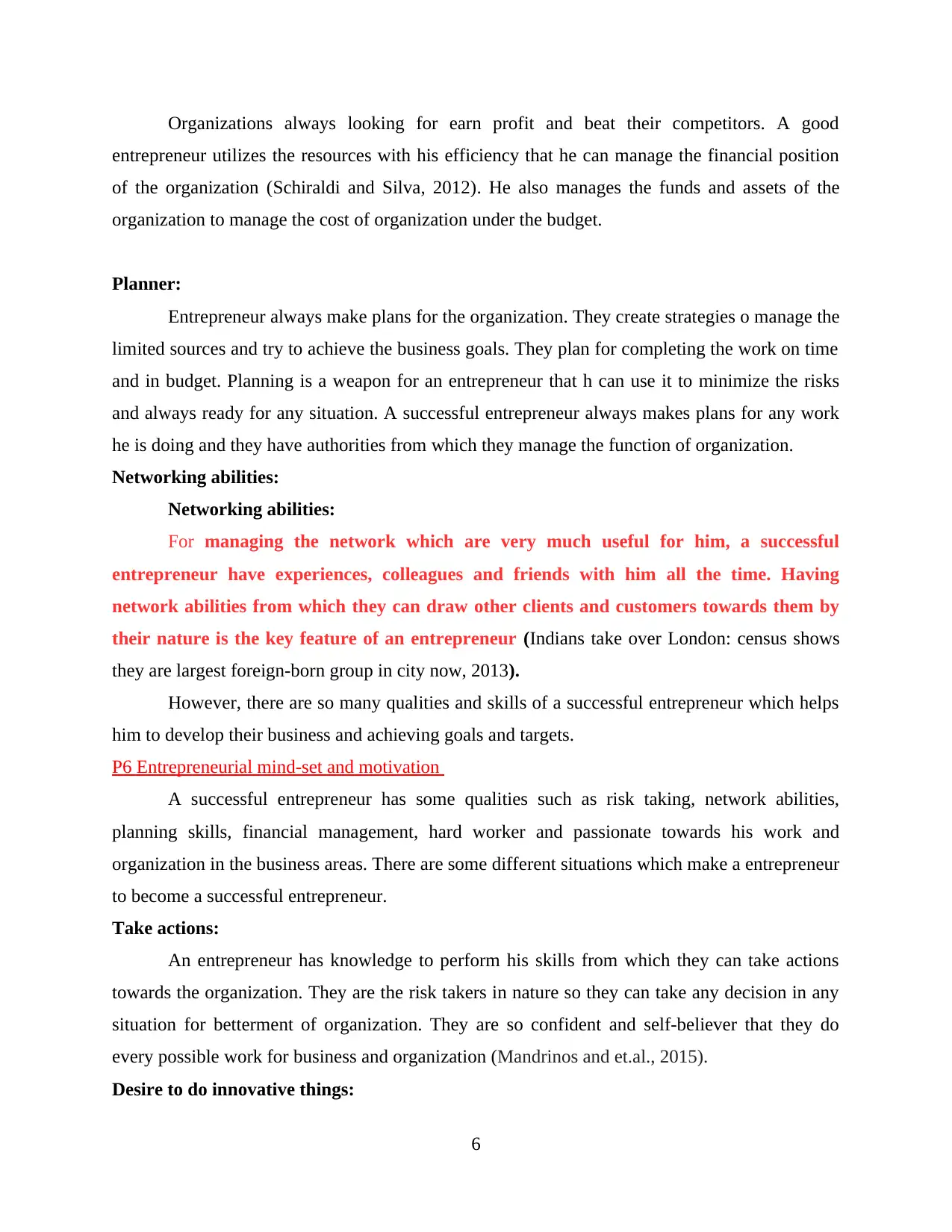
Organizations always looking for earn profit and beat their competitors. A good
entrepreneur utilizes the resources with his efficiency that he can manage the financial position
of the organization (Schiraldi and Silva, 2012). He also manages the funds and assets of the
organization to manage the cost of organization under the budget.
Planner:
Entrepreneur always make plans for the organization. They create strategies o manage the
limited sources and try to achieve the business goals. They plan for completing the work on time
and in budget. Planning is a weapon for an entrepreneur that h can use it to minimize the risks
and always ready for any situation. A successful entrepreneur always makes plans for any work
he is doing and they have authorities from which they manage the function of organization.
Networking abilities:
Networking abilities:
For managing the network which are very much useful for him, a successful
entrepreneur have experiences, colleagues and friends with him all the time. Having
network abilities from which they can draw other clients and customers towards them by
their nature is the key feature of an entrepreneur (Indians take over London: census shows
they are largest foreign-born group in city now, 2013).
However, there are so many qualities and skills of a successful entrepreneur which helps
him to develop their business and achieving goals and targets.
P6 Entrepreneurial mind-set and motivation
A successful entrepreneur has some qualities such as risk taking, network abilities,
planning skills, financial management, hard worker and passionate towards his work and
organization in the business areas. There are some different situations which make a entrepreneur
to become a successful entrepreneur.
Take actions:
An entrepreneur has knowledge to perform his skills from which they can take actions
towards the organization. They are the risk takers in nature so they can take any decision in any
situation for betterment of organization. They are so confident and self-believer that they do
every possible work for business and organization (Mandrinos and et.al., 2015).
Desire to do innovative things:
6
entrepreneur utilizes the resources with his efficiency that he can manage the financial position
of the organization (Schiraldi and Silva, 2012). He also manages the funds and assets of the
organization to manage the cost of organization under the budget.
Planner:
Entrepreneur always make plans for the organization. They create strategies o manage the
limited sources and try to achieve the business goals. They plan for completing the work on time
and in budget. Planning is a weapon for an entrepreneur that h can use it to minimize the risks
and always ready for any situation. A successful entrepreneur always makes plans for any work
he is doing and they have authorities from which they manage the function of organization.
Networking abilities:
Networking abilities:
For managing the network which are very much useful for him, a successful
entrepreneur have experiences, colleagues and friends with him all the time. Having
network abilities from which they can draw other clients and customers towards them by
their nature is the key feature of an entrepreneur (Indians take over London: census shows
they are largest foreign-born group in city now, 2013).
However, there are so many qualities and skills of a successful entrepreneur which helps
him to develop their business and achieving goals and targets.
P6 Entrepreneurial mind-set and motivation
A successful entrepreneur has some qualities such as risk taking, network abilities,
planning skills, financial management, hard worker and passionate towards his work and
organization in the business areas. There are some different situations which make a entrepreneur
to become a successful entrepreneur.
Take actions:
An entrepreneur has knowledge to perform his skills from which they can take actions
towards the organization. They are the risk takers in nature so they can take any decision in any
situation for betterment of organization. They are so confident and self-believer that they do
every possible work for business and organization (Mandrinos and et.al., 2015).
Desire to do innovative things:
6
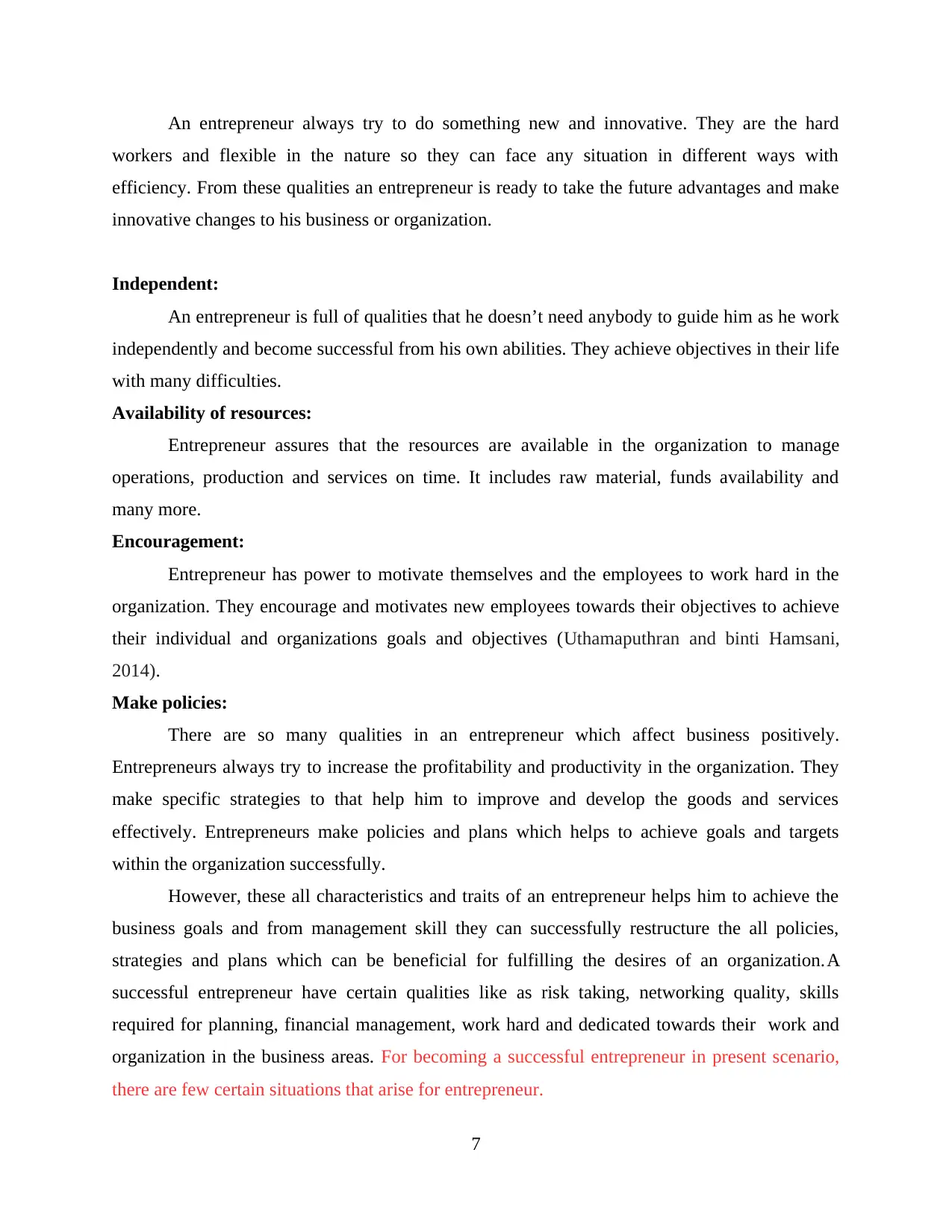
An entrepreneur always try to do something new and innovative. They are the hard
workers and flexible in the nature so they can face any situation in different ways with
efficiency. From these qualities an entrepreneur is ready to take the future advantages and make
innovative changes to his business or organization.
Independent:
An entrepreneur is full of qualities that he doesn’t need anybody to guide him as he work
independently and become successful from his own abilities. They achieve objectives in their life
with many difficulties.
Availability of resources:
Entrepreneur assures that the resources are available in the organization to manage
operations, production and services on time. It includes raw material, funds availability and
many more.
Encouragement:
Entrepreneur has power to motivate themselves and the employees to work hard in the
organization. They encourage and motivates new employees towards their objectives to achieve
their individual and organizations goals and objectives (Uthamaputhran and binti Hamsani,
2014).
Make policies:
There are so many qualities in an entrepreneur which affect business positively.
Entrepreneurs always try to increase the profitability and productivity in the organization. They
make specific strategies to that help him to improve and develop the goods and services
effectively. Entrepreneurs make policies and plans which helps to achieve goals and targets
within the organization successfully.
However, these all characteristics and traits of an entrepreneur helps him to achieve the
business goals and from management skill they can successfully restructure the all policies,
strategies and plans which can be beneficial for fulfilling the desires of an organization.A
successful entrepreneur have certain qualities like as risk taking, networking quality, skills
required for planning, financial management, work hard and dedicated towards their work and
organization in the business areas. For becoming a successful entrepreneur in present scenario,
there are few certain situations that arise for entrepreneur.
7
workers and flexible in the nature so they can face any situation in different ways with
efficiency. From these qualities an entrepreneur is ready to take the future advantages and make
innovative changes to his business or organization.
Independent:
An entrepreneur is full of qualities that he doesn’t need anybody to guide him as he work
independently and become successful from his own abilities. They achieve objectives in their life
with many difficulties.
Availability of resources:
Entrepreneur assures that the resources are available in the organization to manage
operations, production and services on time. It includes raw material, funds availability and
many more.
Encouragement:
Entrepreneur has power to motivate themselves and the employees to work hard in the
organization. They encourage and motivates new employees towards their objectives to achieve
their individual and organizations goals and objectives (Uthamaputhran and binti Hamsani,
2014).
Make policies:
There are so many qualities in an entrepreneur which affect business positively.
Entrepreneurs always try to increase the profitability and productivity in the organization. They
make specific strategies to that help him to improve and develop the goods and services
effectively. Entrepreneurs make policies and plans which helps to achieve goals and targets
within the organization successfully.
However, these all characteristics and traits of an entrepreneur helps him to achieve the
business goals and from management skill they can successfully restructure the all policies,
strategies and plans which can be beneficial for fulfilling the desires of an organization.A
successful entrepreneur have certain qualities like as risk taking, networking quality, skills
required for planning, financial management, work hard and dedicated towards their work and
organization in the business areas. For becoming a successful entrepreneur in present scenario,
there are few certain situations that arise for entrepreneur.
7
⊘ This is a preview!⊘
Do you want full access?
Subscribe today to unlock all pages.

Trusted by 1+ million students worldwide
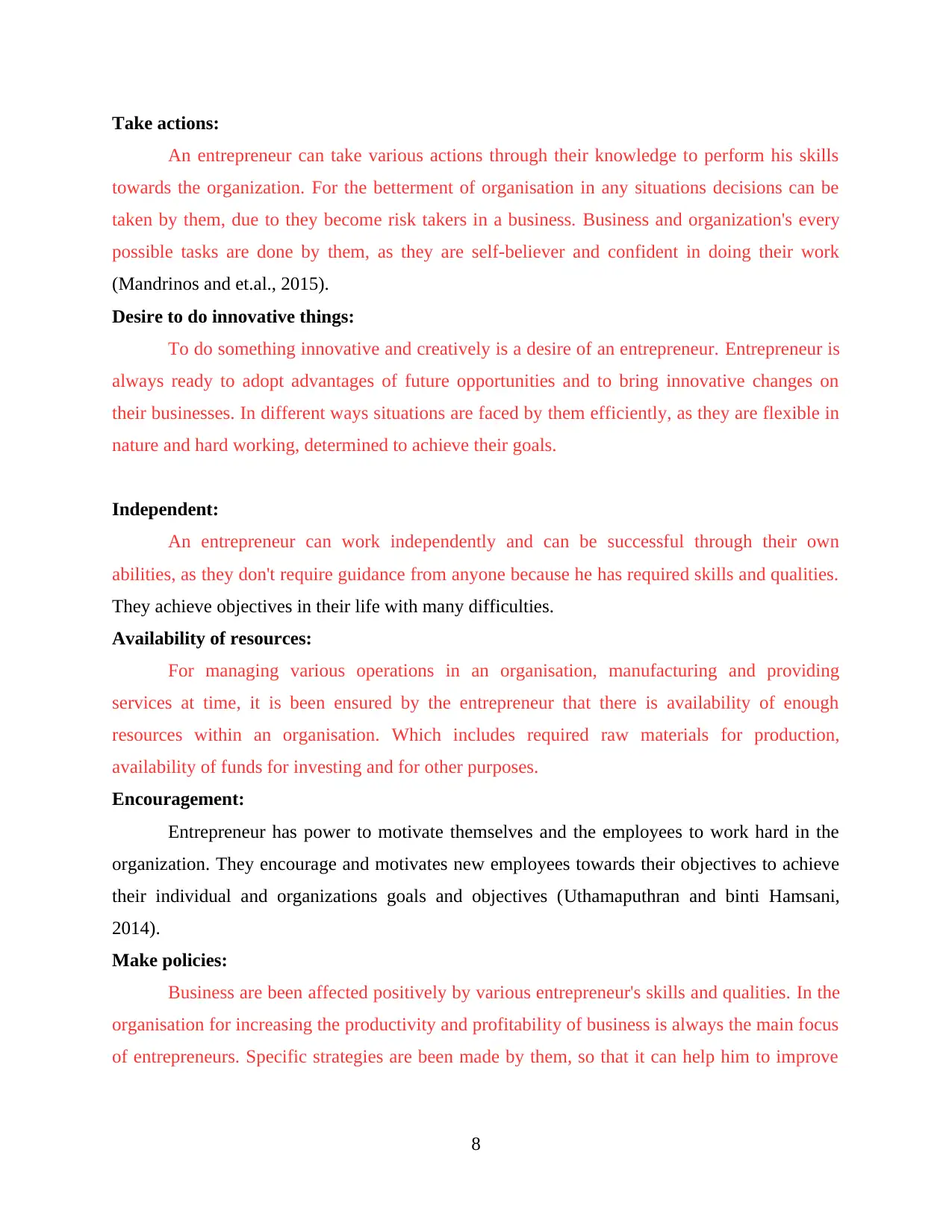
Take actions:
An entrepreneur can take various actions through their knowledge to perform his skills
towards the organization. For the betterment of organisation in any situations decisions can be
taken by them, due to they become risk takers in a business. Business and organization's every
possible tasks are done by them, as they are self-believer and confident in doing their work
(Mandrinos and et.al., 2015).
Desire to do innovative things:
To do something innovative and creatively is a desire of an entrepreneur. Entrepreneur is
always ready to adopt advantages of future opportunities and to bring innovative changes on
their businesses. In different ways situations are faced by them efficiently, as they are flexible in
nature and hard working, determined to achieve their goals.
Independent:
An entrepreneur can work independently and can be successful through their own
abilities, as they don't require guidance from anyone because he has required skills and qualities.
They achieve objectives in their life with many difficulties.
Availability of resources:
For managing various operations in an organisation, manufacturing and providing
services at time, it is been ensured by the entrepreneur that there is availability of enough
resources within an organisation. Which includes required raw materials for production,
availability of funds for investing and for other purposes.
Encouragement:
Entrepreneur has power to motivate themselves and the employees to work hard in the
organization. They encourage and motivates new employees towards their objectives to achieve
their individual and organizations goals and objectives (Uthamaputhran and binti Hamsani,
2014).
Make policies:
Business are been affected positively by various entrepreneur's skills and qualities. In the
organisation for increasing the productivity and profitability of business is always the main focus
of entrepreneurs. Specific strategies are been made by them, so that it can help him to improve
8
An entrepreneur can take various actions through their knowledge to perform his skills
towards the organization. For the betterment of organisation in any situations decisions can be
taken by them, due to they become risk takers in a business. Business and organization's every
possible tasks are done by them, as they are self-believer and confident in doing their work
(Mandrinos and et.al., 2015).
Desire to do innovative things:
To do something innovative and creatively is a desire of an entrepreneur. Entrepreneur is
always ready to adopt advantages of future opportunities and to bring innovative changes on
their businesses. In different ways situations are faced by them efficiently, as they are flexible in
nature and hard working, determined to achieve their goals.
Independent:
An entrepreneur can work independently and can be successful through their own
abilities, as they don't require guidance from anyone because he has required skills and qualities.
They achieve objectives in their life with many difficulties.
Availability of resources:
For managing various operations in an organisation, manufacturing and providing
services at time, it is been ensured by the entrepreneur that there is availability of enough
resources within an organisation. Which includes required raw materials for production,
availability of funds for investing and for other purposes.
Encouragement:
Entrepreneur has power to motivate themselves and the employees to work hard in the
organization. They encourage and motivates new employees towards their objectives to achieve
their individual and organizations goals and objectives (Uthamaputhran and binti Hamsani,
2014).
Make policies:
Business are been affected positively by various entrepreneur's skills and qualities. In the
organisation for increasing the productivity and profitability of business is always the main focus
of entrepreneurs. Specific strategies are been made by them, so that it can help him to improve
8
Paraphrase This Document
Need a fresh take? Get an instant paraphrase of this document with our AI Paraphraser
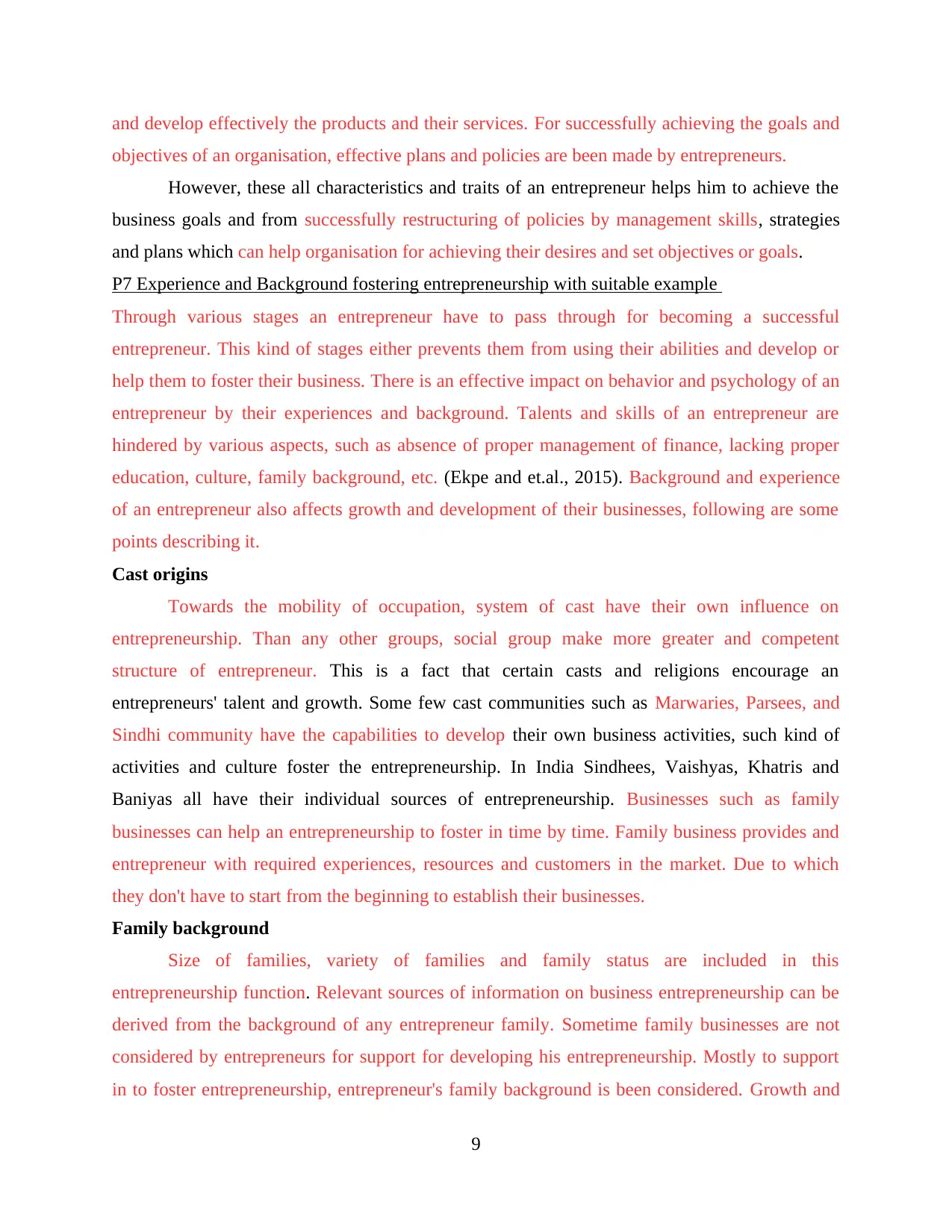
and develop effectively the products and their services. For successfully achieving the goals and
objectives of an organisation, effective plans and policies are been made by entrepreneurs.
However, these all characteristics and traits of an entrepreneur helps him to achieve the
business goals and from successfully restructuring of policies by management skills, strategies
and plans which can help organisation for achieving their desires and set objectives or goals.
P7 Experience and Background fostering entrepreneurship with suitable example
Through various stages an entrepreneur have to pass through for becoming a successful
entrepreneur. This kind of stages either prevents them from using their abilities and develop or
help them to foster their business. There is an effective impact on behavior and psychology of an
entrepreneur by their experiences and background. Talents and skills of an entrepreneur are
hindered by various aspects, such as absence of proper management of finance, lacking proper
education, culture, family background, etc. (Ekpe and et.al., 2015). Background and experience
of an entrepreneur also affects growth and development of their businesses, following are some
points describing it.
Cast origins
Towards the mobility of occupation, system of cast have their own influence on
entrepreneurship. Than any other groups, social group make more greater and competent
structure of entrepreneur. This is a fact that certain casts and religions encourage an
entrepreneurs' talent and growth. Some few cast communities such as Marwaries, Parsees, and
Sindhi community have the capabilities to develop their own business activities, such kind of
activities and culture foster the entrepreneurship. In India Sindhees, Vaishyas, Khatris and
Baniyas all have their individual sources of entrepreneurship. Businesses such as family
businesses can help an entrepreneurship to foster in time by time. Family business provides and
entrepreneur with required experiences, resources and customers in the market. Due to which
they don't have to start from the beginning to establish their businesses.
Family background
Size of families, variety of families and family status are included in this
entrepreneurship function. Relevant sources of information on business entrepreneurship can be
derived from the background of any entrepreneur family. Sometime family businesses are not
considered by entrepreneurs for support for developing his entrepreneurship. Mostly to support
in to foster entrepreneurship, entrepreneur's family background is been considered. Growth and
9
objectives of an organisation, effective plans and policies are been made by entrepreneurs.
However, these all characteristics and traits of an entrepreneur helps him to achieve the
business goals and from successfully restructuring of policies by management skills, strategies
and plans which can help organisation for achieving their desires and set objectives or goals.
P7 Experience and Background fostering entrepreneurship with suitable example
Through various stages an entrepreneur have to pass through for becoming a successful
entrepreneur. This kind of stages either prevents them from using their abilities and develop or
help them to foster their business. There is an effective impact on behavior and psychology of an
entrepreneur by their experiences and background. Talents and skills of an entrepreneur are
hindered by various aspects, such as absence of proper management of finance, lacking proper
education, culture, family background, etc. (Ekpe and et.al., 2015). Background and experience
of an entrepreneur also affects growth and development of their businesses, following are some
points describing it.
Cast origins
Towards the mobility of occupation, system of cast have their own influence on
entrepreneurship. Than any other groups, social group make more greater and competent
structure of entrepreneur. This is a fact that certain casts and religions encourage an
entrepreneurs' talent and growth. Some few cast communities such as Marwaries, Parsees, and
Sindhi community have the capabilities to develop their own business activities, such kind of
activities and culture foster the entrepreneurship. In India Sindhees, Vaishyas, Khatris and
Baniyas all have their individual sources of entrepreneurship. Businesses such as family
businesses can help an entrepreneurship to foster in time by time. Family business provides and
entrepreneur with required experiences, resources and customers in the market. Due to which
they don't have to start from the beginning to establish their businesses.
Family background
Size of families, variety of families and family status are included in this
entrepreneurship function. Relevant sources of information on business entrepreneurship can be
derived from the background of any entrepreneur family. Sometime family businesses are not
considered by entrepreneurs for support for developing his entrepreneurship. Mostly to support
in to foster entrepreneurship, entrepreneur's family background is been considered. Growth and
9
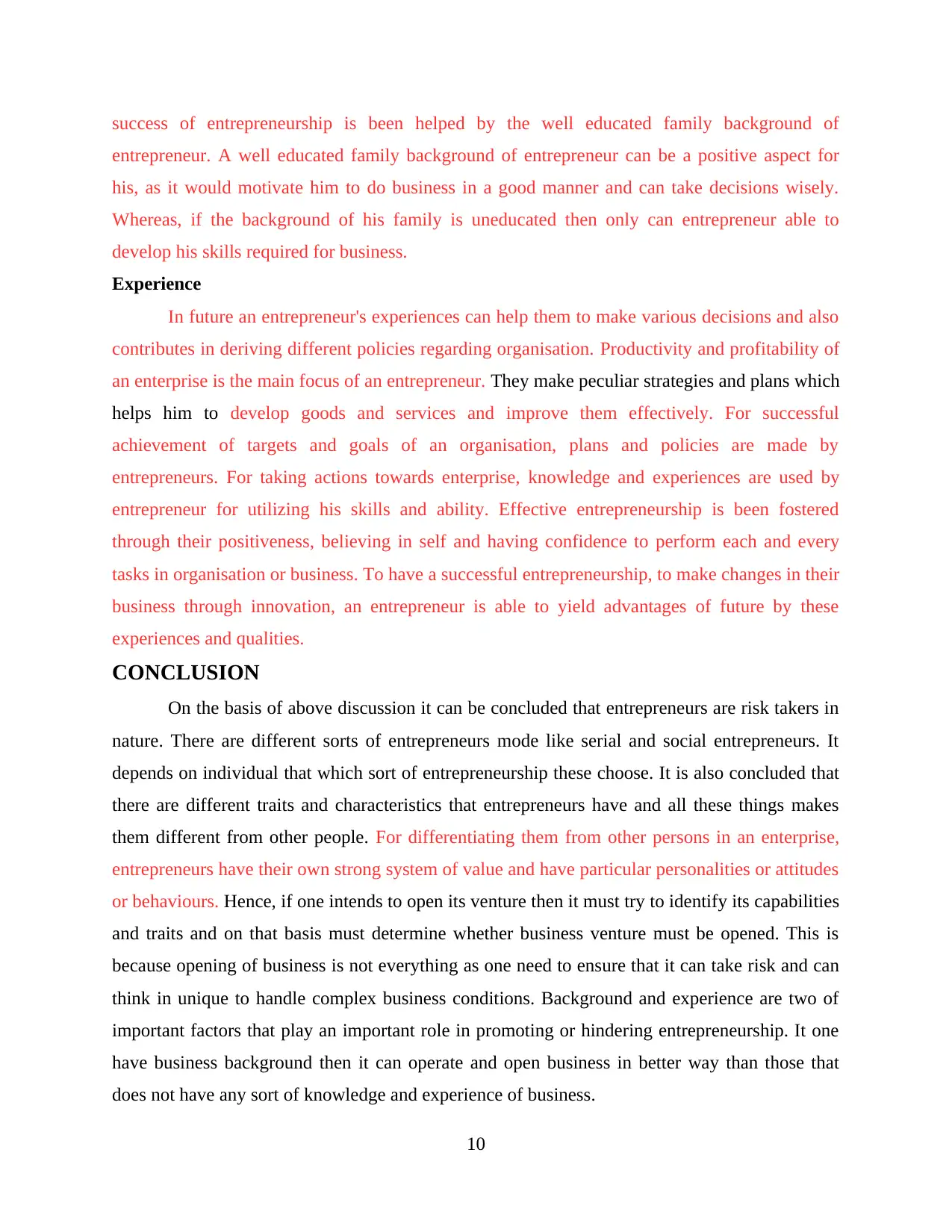
success of entrepreneurship is been helped by the well educated family background of
entrepreneur. A well educated family background of entrepreneur can be a positive aspect for
his, as it would motivate him to do business in a good manner and can take decisions wisely.
Whereas, if the background of his family is uneducated then only can entrepreneur able to
develop his skills required for business.
Experience
In future an entrepreneur's experiences can help them to make various decisions and also
contributes in deriving different policies regarding organisation. Productivity and profitability of
an enterprise is the main focus of an entrepreneur. They make peculiar strategies and plans which
helps him to develop goods and services and improve them effectively. For successful
achievement of targets and goals of an organisation, plans and policies are made by
entrepreneurs. For taking actions towards enterprise, knowledge and experiences are used by
entrepreneur for utilizing his skills and ability. Effective entrepreneurship is been fostered
through their positiveness, believing in self and having confidence to perform each and every
tasks in organisation or business. To have a successful entrepreneurship, to make changes in their
business through innovation, an entrepreneur is able to yield advantages of future by these
experiences and qualities.
CONCLUSION
On the basis of above discussion it can be concluded that entrepreneurs are risk takers in
nature. There are different sorts of entrepreneurs mode like serial and social entrepreneurs. It
depends on individual that which sort of entrepreneurship these choose. It is also concluded that
there are different traits and characteristics that entrepreneurs have and all these things makes
them different from other people. For differentiating them from other persons in an enterprise,
entrepreneurs have their own strong system of value and have particular personalities or attitudes
or behaviours. Hence, if one intends to open its venture then it must try to identify its capabilities
and traits and on that basis must determine whether business venture must be opened. This is
because opening of business is not everything as one need to ensure that it can take risk and can
think in unique to handle complex business conditions. Background and experience are two of
important factors that play an important role in promoting or hindering entrepreneurship. It one
have business background then it can operate and open business in better way than those that
does not have any sort of knowledge and experience of business.
10
entrepreneur. A well educated family background of entrepreneur can be a positive aspect for
his, as it would motivate him to do business in a good manner and can take decisions wisely.
Whereas, if the background of his family is uneducated then only can entrepreneur able to
develop his skills required for business.
Experience
In future an entrepreneur's experiences can help them to make various decisions and also
contributes in deriving different policies regarding organisation. Productivity and profitability of
an enterprise is the main focus of an entrepreneur. They make peculiar strategies and plans which
helps him to develop goods and services and improve them effectively. For successful
achievement of targets and goals of an organisation, plans and policies are made by
entrepreneurs. For taking actions towards enterprise, knowledge and experiences are used by
entrepreneur for utilizing his skills and ability. Effective entrepreneurship is been fostered
through their positiveness, believing in self and having confidence to perform each and every
tasks in organisation or business. To have a successful entrepreneurship, to make changes in their
business through innovation, an entrepreneur is able to yield advantages of future by these
experiences and qualities.
CONCLUSION
On the basis of above discussion it can be concluded that entrepreneurs are risk takers in
nature. There are different sorts of entrepreneurs mode like serial and social entrepreneurs. It
depends on individual that which sort of entrepreneurship these choose. It is also concluded that
there are different traits and characteristics that entrepreneurs have and all these things makes
them different from other people. For differentiating them from other persons in an enterprise,
entrepreneurs have their own strong system of value and have particular personalities or attitudes
or behaviours. Hence, if one intends to open its venture then it must try to identify its capabilities
and traits and on that basis must determine whether business venture must be opened. This is
because opening of business is not everything as one need to ensure that it can take risk and can
think in unique to handle complex business conditions. Background and experience are two of
important factors that play an important role in promoting or hindering entrepreneurship. It one
have business background then it can operate and open business in better way than those that
does not have any sort of knowledge and experience of business.
10
⊘ This is a preview!⊘
Do you want full access?
Subscribe today to unlock all pages.

Trusted by 1+ million students worldwide
1 out of 14
Related Documents
Your All-in-One AI-Powered Toolkit for Academic Success.
+13062052269
info@desklib.com
Available 24*7 on WhatsApp / Email
![[object Object]](/_next/static/media/star-bottom.7253800d.svg)
Unlock your academic potential
Copyright © 2020–2026 A2Z Services. All Rights Reserved. Developed and managed by ZUCOL.



